Crapshoot: Wiedźmin, the Witcher movie from 2001
We're rerunning Richard Cobbett's classic Crapshoot column, in which he rolled the dice and took a chance on obscure games—both good and bad.
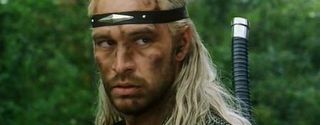
From 2010 to 2014 Richard Cobbett wrote Crapshoot, a column about bringing random obscure games back into the light. And sometimes, as in this column from 2011, a movie. In honor of Netflix's big-budget adaptation coming to our screens, let's look back at a lower-budget take.
To most people in the UK and US, The Witcher is simply a cool RPG, based on some books and short stories they've never actually read. In its native Poland, things are rather different. The series' creator, Andrzej Sapkowski, is one of the best known fantasy authors, with the stories winning prizes and popularity since 1986. The first anthology, The Last Wish, came out in English around the same time as the game. If you haven't read them, they're worth checking out, available in both traditional dead tree form and on the mighty Amazon Kindle.
And then there's the all-important movie, which tried to give the series the full Lord of the Rings treatment. With all this great material to work with, can you imagine how good that must be?
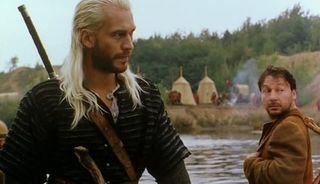
Well, wonder no more. It's rubbish, and about as popular with the fans as the Dungeons & Dragons movie was with our own home-grown nerds. It plays fast and loose with many of the original stories' characters and premises, and what little remains is largely destroyed by the pacing. Wiedźmin (the name of Geralt's job in the original stories, which translates roughly as 'warlock') isn't technically a real film, you see. It's a 13-episode TV series hacked down into two hours, and works about as well as that makes it sound. It was released internationally under the name 'The Hexer', the term 'witcher' not becoming the accepted English translation until CD Projekt chose it for the game, and the book's translator used it for the first collection. Copies aren't hard to find, although they're a bit pricey, and import only.
Despite its unpopularity though, there are definitely worse fantasy films. The aforementioned Dungeons & Dragons is about a million times more obnoxious, just for starters. Any fantasy movie that found its way onto Mystery Science Theater 3000 or lurks in the free streaming section of your favourite online video store. Wiedźmin (and yes, I am totally copy and pasting that) at least tries to have its own feel, and it's not hurt by the grubby video quality, miserable weather framing the shots, and a rustic look that's as much down to the budget as actual set and costume design. Its problems range from that low budget to dreadful fight choreography and generally weak acting, although by far the biggest is the chaotic editing. Scene by scene, it's largely incoherent—characters appearing with no introduction and vanishing just as quickly, years passing between segments without comment, and the whole thing strung together by the earnest belief that you already know what's going on. Overall though, I give it 95%.
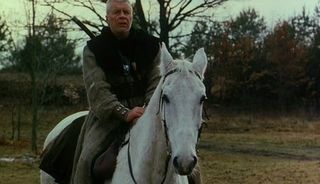
The movie opens on the title credits of Monty Python and the Holy Grail. Close enough, anyway. Booming, ominous music. The credits slamming onto the screen with drums and drama and menace, but without the Swedish subtitles. You can probably get Swedish subtitles if you want to complete the effect, but one language removed from English is quite enough for me. Before everyone can be sacked though, along with the people who sacked them, the black fades out to show a scary man on a horse, riding through a field—scarred, and with a sword over his back. He is of course a Witcher, and I'm going to use that term for the rest of this page because 'Hexer' sounds even sillier.
A peasant emerges from a hut, clearly neither happy nor surprised to see him. "I've come for your son," the Witcher tells him. The peasant tries to bluff him into going away, but this—like peasants—doesn't wash. It turns out that seven years ago, the man effectively sold his son by means of the Right of Surprise, a custom backed by all sorts of nasty curses that's effectively a big celestial gamble. The way it works is that if you owe a debt to someone, they make you promise to give them "what you find at home yet don't expect". The Witcher being a dark, fairy-tale inspired world, that's almost inevitably going to turn out to be a child rather than an Avon catalogue or a Werther's Original behind the sofa. The peasant man invites the Witcher to more or less go screw himself with an extra-large baguette, but is rudely cut-off by a fade to black because THERE IS NO TIME TO ARGUE!
PC Gamer Newsletter
Sign up to get the best content of the week, and great gaming deals, as picked by the editors.
Still, the Witchers are decent people, right? What's the worst that could happen?
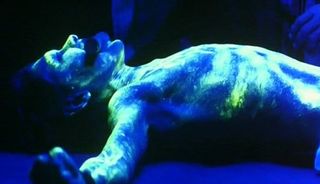
Racing as fast as the edit suite can manage, we see the child, Geralt of Rivia (who isn't actually from Rivia, he just chose that name because everyone sounds better if they have somewhere to be from) train from infancy to adulthood and finally become a fully fledged Witcher. This sequence covers him being tortured by mutations, spotting other Witchers gone rogue attacking humans, narcing on them, making a nemesis in their scarred leader, who for want of a name at this point, I'll simply call Some Guy, being sworn in as a Witcher, deciding he wants to devote his life to the cause of fighting monsters, collecting his steel sword and special silver sword of monster slaying, and setting out on horseback into the big wide world in search of adventure. Total time elapsed: About three minutes. Urk.
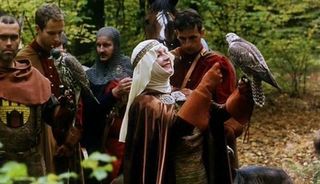
Meanwhile, in another movie not far away, Queen Calanthe and Princess Pavetta are riding through the woods. Pavetta has something on her mind, but the queen is far too busy having a good time to listen. Soon enough, Pavetta's stunt double finds herself thrown off her horse, which promptly flees. Calanthe jumps down to assist her, and the two are promptly attacked by a terrifying sock puppet with teeth. In the world of the Witcher, this is known as a 'monster', if only for the sake of tradition. Geralt leaps in from off screen to save the day by stabbing it a couple of times, and then suddenly we're in a castle, where we find out that the Queen is so aloof, she had to wait until she got home and probably had a bath before getting changed, before asking about the identity of her rescuer.
Not from Geralt, of course, but one of her underlings. She is a Queen.
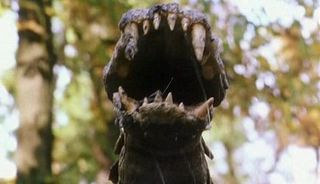
The Lord High Chamberlain of Plot Exposition exposits that Geralt claims to only have been hunting in the woods, and hasn't asked for a reward for saving them. Calanthe makes it clear that she considers him and his kind to be located somewhere amongst the worms in the great social strata of life, but might have a use for him. Pavetta doesn't get much more compassion out of her when she shows up to beg to be let out of her forthcoming arranged marriage, which she's having, incidentally, but only ends up being sent to her room. We also find out that something vague is going on in the castle, with a suitably vague solution. But that has to wait for later, because it's suddenly the next day probably and Calanthe is bending Geralt's ear about the empire of Nilfgaard and why it sucks.
Gasp! Finally, we get some breathing room. Where were we? Ah, yes. Nilfgaard. The Witcher stories go in for shades of grey, and that's one of the best things about them. Still, most people Geralt bumps into, in any version, will agree that Nilfgaard are probably best classed as 'the baddies'. Calanthe explains that Pavetta is to marry the king's nephew to help save the kingdom, and recruits Geralt to guard her until that can happen. Immediately, we found out that Pavetta is magic, and able to put the whole castle to sleep, except for a knight with the most ridiculous spiky helmet, who looks at Geralt as if to say "Look at my spiky helmet" and walks away, and then it's the next day and we find out that a knight called The Hedgehog is also claiming Pavetta as his bride because of something said ages ago, and the Queen recruits Geralt to go do something about him. Permanently. With a sword.
This is what happens when you try to condense a whole episode worth of story into a handful of minutes. It's like trying to watch Lord of the Rings at 10x speed, with everyone speaking in Vague.
Geralt explains that he only does monsters, but the queen says that's okay. The Hedgehog looks like one, so it's probably close enough. As uneasy as a man can be without having the time to show an actual emotion, he rides out, stopped only by Pavetta politely asking him to not actually kill his target, if that's all the same to him. Geralt simply tells her he'll decide which option on the dialogue tree he takes when he gets there, and heads off, wondering how much XP he can expect for it later.
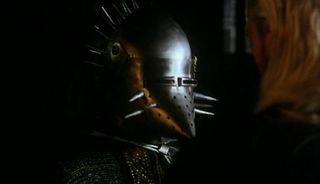
The Hedgehog turns out to be a reasonable guy, despite his incredibly silly helmet, and Geralt opts not to kill him. As bells ring in the background, he insists that the Hedgehog show him his face. The Hedgehog politely declines for the moment, and instead claims that Pavetta is his by Right of Surprise. Geralt tells him that he can go stick it, and that he clearly only wants her for her magic. Which, er, he hasn't really been shown to even know about at this point. The Hedgehog doesn't deny this, but finally takes off the silly helmet claiming that now it's midnight, he'll be human until dawn. He explains that by day, his face turns into a hedgehog's, and the local mages have told him that only the Right can save him.
So... he's been waiting 16 years for a night of Surprise sex with a teenage girl.
Yep. No squick there at all, not a bit.
Jumpcut! Geralt heads back to the Queen to tell her that Pavetta and the Hedgehog have already made the beast with two backs and presumably lots of very unpleasant spiky bits. Jumpcut! Pavetta angrily confess the same, bitterly adding that she thinks her mother only sees her as a political instrument—something that Calanthe just about manages to avoid replying to with "You do realise how this whole feudal thing works, right?" Jumpcut! Now the Queen bitches Geralt out for not killing the Hedgehog, despite never having promised to do that anyway. Geralt shrugs this off, but says that the Pavetta should be married for the sake of love, and never mind what happens when the Nilfgaardians show up to kill everyone. Besides, he adds, if it's the Right of Surprise, it's fated anyway.
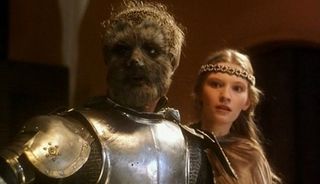
Luckily, the argument is immediately resolved off-camera, and the Hedgehog shows up at a banquet thrown for Pavetta's suitors. The Queen ungraciously invites him to sit down, while telling everyone about how he "heroically" "saved" her husband in "the past", and so gets first dibs on her daughter. The Hedgehog refuses both that and the order to take his helmet off and show everyone his adorable little snout, but soon has his helmet ripped off anyway. Everyone about manages to avoid going "Awwww! You're so cute! ", but unfortunately because they're busy shouting "Kill the freak!"
And... well... this happens. If you have earplugs, now is the time to wear them.
Screamingly annoying fight—literally—finally over, the Queen gives up and hands her daughter over. The next morning, Pavetta is still nursing Hedgehog's wounds, but at least he's human. Pavetta begs Geralt to stay, as does the Knight Formerly Known As The Hedgehog, who says that he knows Geralt doesn't like him (although exactly why must have been off-screen), but he still wants to reward him. Geralt politely turns down the offer, and the Vice Minister of Plot Exposition hastily rushes in to tell the assembled crowd that the only thing he'd actually be allowed to ask them for is the Right of Surprise and that this would be a really, really good time for everyone to shut the hell up. He asks Geralt to leave. Geralt does. Without any argument, disappointment or offence, he willingly turns to leave, empty-handed.
Unfortunately, Formerly The Hedgehog immediately reveals himself as the single stupidest man in the universe by deciding that now would be a great time to be a dick. He insists his debt to Geralt be settled right now, on the grounds that otherwise the dirty little Witcher man will just show up at some point anyway with the balls to think he's owed a favour by the royal house he saved. To the sound of palms hitting faces around the palace, Geralt immediately turns and bitch-slaps him with a good old "You'll give me what you don't know you have," and storms out in a huff, at which point Pavetta decides she's probably waited a couple of minutes too long to tell him that she's pregnant.
Unfortunately, the action fades out before the camera switches to their wedding bed, which I suspect to be a fairly quiet affair with at least one sudden 'headache' and the lingering threat of castration when the candles finally go out on the happy couple later on that night. End of episode.
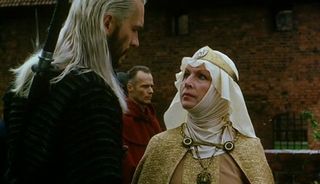
In itself, this isn't a horrible story. Its problems largely, though not exclusively, stemming from the sheer speed that it has to whip through the storyline. In its originally written episodic form (the series came out after the movie, but was obviously filmed before then, unless Poland has time machines they're not telling the rest of us about) it may have been OK. Neither version however is even close to its source material, the short story "A Question of Price", as printed in The Last Wish. In this, Geralt is undercover in the castle as a lord, with much more focus put on the place of witchers in the Witcher world. Much of it is devoted to him simply talking to Queen Calanthe, with the Hedgehog (Urcheon) showing up during the middle of the banquet instead of being hunted. Plenty of other changes too.
Despite the completely different story structure though, the biggest difference is Geralt's personality. In the book, he has one. In the live-action version, he more or less looks the part (if much younger than the Geralt we know from the games, which take place after the series), but is a thoroughly uninteresting man. In the books and the games, he's usually best in two types of situation—when he's being deadpan, and when he's pretending not to be sentimental and heroic (for instance quoting the Witcher Code, which he wrote himself so that he'd have an excuse not to do things he didn't want to). This leads to some really interesting moments and clashes. For instance, you know how the live-action version ends, with the ex-Hedgehog being a moron. Here's how it goes in the book version.
The set-up for this extract: Queen Calanthe has already made it clear that whatever Geralt's tab is, she'll pay it on the Hedgehog's behalf (his name is Duny). Being more than a little politically savvy, he merely asks her for her green sash, claiming it's the colour of her beautiful eyes.
Calanthe laughed, and unfastened her emerald necklace. "This trinket," she said, "has stones of the right hue. Keep it, and the memory."
"May I speak?" asked Duny modestly.
"But of course, Son-in-law, please do, please do."
"I still say I am in your debt, witcher. It is my life that Rainfarn's dagger endangered. I would have been beaten to death by the guards without you. If there's talk of a price then I should be the one to pay. I assure you I can afford it. What do you ask, Geralt?"
"Duny," said Geralt slowly, "A witcher who is asked such a question has to ask to have it repeated."
"I repeat, therefore. Because, you see, I am in your debt for still another reason. When I found out who you were, there in the hall, I hated you and thought very badly of you. I took you for a blind, bloodthirsty tool, for someone who kills coldly and without question, who wipes his blade clean of blood and counts the cash. But I've become convinced that the witcher's profession is worthy of respect. You protect us not only from the evil lurking in the darkness, but also from that which lies within ourselves. It's a shame there are so few of you."
Calanthe smiled. For the first time that night, Geralt was inclined to believe it was genuine.
"My son-in-law has spoken well. I have to add two words to what he said. Precisely two. Forgive, Geralt."
"And I," said Duny, "ask again. What do you ask for?"
"Duny," said Geralt seriously, "Calanthe. Pavetta. And you, righteous knight Tuirseach, future king of Cintra. In order to become a witcher, you have to be born in the shadow of destiny, and very few are born like that. That's why there are so few of us. We're growing old, dying, without anyone to pass our knowledge, our gifts, on to. We lack successors. And this world is full of Evil, which waits for the day none of us are left."
"Geralt," whispered Calanthe.
"Yes, you're not wrong, Queen. Duny! You will give me that which you already have but do not know. I'll return to Cintra in six years to see if destiny has been kind to me."
"Pavetta," Duny opened his eyes wide. "Surely you're not..."
"Pavetta!" exclaimed Calanthe. "Are you.. are you-"
The princess lowered her eyes and blushed. And replied.
Clumsy as some of that prose is (which could well be a translation issue—not speaking Polish, I have no idea what the original is like), it's not hard to see why fans weren't wild about the live-action version.
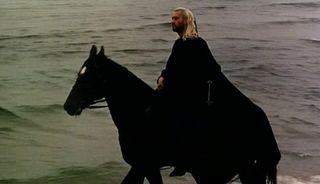
The whole movie follows a similar pattern. Lots of segments, some followed up later, others more episodic. Geralt does finally return to the Queen for instance, but not to take her grandchild—although this doesn't matter, as their paths ultimately cross anyway. Unfortunately, going through the whole film here is largely impossible, for one reason. You know how far in we are after all that?
20 minutes. Wiedźmin is two hours long.
Let's take a look at the second story though, because it's a fair bit simpler and features some familiar faces from the games. Again, we don't start with Geralt, but with some regular folks in trouble. They just don't realise it yet. As far as they know, they're dangerous thieves preparing to steal from a horse in the middle of the forest, and who don't take too kindly when a smiling defenseless knight who looks a lot like Hodges from the TV show Bones suggests they might want to reconsider.
Much as Duny didn't quite work out the whole "Don't promise anything when you live in a fairy-tale world, you moron," thing, they haven't quite worked out that attacking the smiling, defenseless knight in the middle of a forest is never a great survival technique. Sir Hodges of Bones smiles even more, tells them that he's not without weapons. They just follow him around, and their names are Vea and Tea—two Amazonian types who promptly drop in to say hello, but not actually do anything due to our old friend Mr. Jumpcut making another confusing return to the edit room.
Meanwhile, presumably, Geralt is in a cave carting around a rubber monster. Why's he here? What's he after? He crawls out carrying it and into the middle of whatever the hell is going on outside. There's a whole group there now, men and women alike, who throw him a bag of orens for his trouble. Geralt queries this, much as the group should probably be asking themselves "Is the tough monster killer with two swords and what's probably meant to be a pissed off expression really worth stiffing today?" As this realisation dawns, they start heading away, until the knight stops them to remind them that some of them pulled a knife on him. Vea or possibly Tea, it's hard to tell, immediately leaps over and slashes his throat open. Harsh for a first offence, yes. But definitely effective.
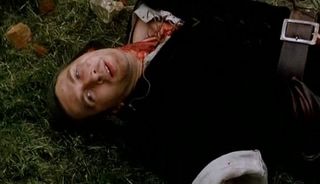
Geralt compliments the smiling knight on the attack, as if it wasn't performed by the Amazon warrior maiden who is still holding the knife and should probably get at least a little bit of the credit for that kill. The knight introduces himself as Borch Three Jackdaws, which is unfortunate and the three head to the nearest pub. Presumably it was Geralt's horse the thieves were trying to steal from, then?
Well, it doesn't really matter. Onwards!
Geralt wastes little time getting drunk and exshplaining the witschers code to Borch, that he doesn't simply kill monsters because they're inconvenient, but because they're a threat. For the others, he's happy to live and let live. He also refuses to slay dragons. No dragons! Absolutely, never, ever a dragon! Ever! (Spoiler Warning: This episode will probably have a dragon in it.)
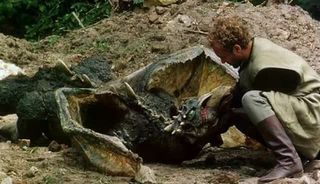
Borch listens patiently to this while apparently eating a giant centipede with one hand and Tea and Vea hovering over his shoulder, getting bored by all the boy-talk. To break it up, they head over to Geralt's side of the table and start pawing at him. Geralt squirms a bit, but not enough to end his fascinating lecture about dragons. After a while, even Borch gets bored and basically tells him to just go get laid already, highly recommending a Tea-Vea dinner.
This makes it all the weirder when the next jump-cut reveals he opted to go have a bath with Borch instead. The girls sneak in stark naked, giggling and pointing and creeping across the room to where the two men are sitting in a giant barrel, before screaming at the top of their lungs and leaping right in in a splashing frenzy, scaring the shit out the great monster hunter... hopefully only in a figurative way. Neither seems particularly upset to be woken up by two soaking wet, stark naked girls in the mood for a good time though, and soon enough a fade-to-the-next-morning transition is peering through the door and asking if it's time yet. And yes, by the wibbling early morning sun, it is time.
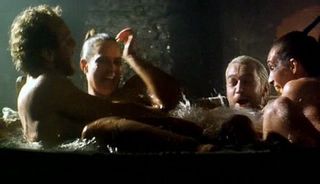
Next morning, Geralt and Borch are riding to somewhere to do something when they get stopped by a man apparently guarding the plot, and Geralt's recurring bard friend Jaskier, better known in the games and books as Dandelion. They all settle down for a picnic and to swap stories about the dragon, and the local way of killing them—to stuff a pig with sulphur and tar and leave it in the middle of a herd as a timebomb. It didn't work very well last time, unless you count the dragon coming back to life, flaming the people who attacked it, and flying off, but the idea seems sound, so dammit, they're going to try again! Geralt immediately works out that whoever's doing it is after the dragon's treasure, and from that, exactly who is leading the party on this quest. He's like Sherlock Holmes, if Sherlock Holmes was a scarred, womanising monster-hunter with a brand new mop on his head.
Borch immediately suggests that the two of them (and Dandelion too, probably) sign up. Geralt isn't wild about that idea, quickly deducing that Borch's plan is to save the dragon by killing everyone going after it, which as a witcher, he can neither watch nor take an active role in.
And then Yennefer of Vengerberg shows up.
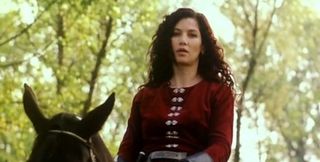
Yennefer is a major character in the Witcher stories, to the point that the search for her whereabouts is one of the games' big running plot threads. She's Geralt's one true love; a sorceress, a mystery and an enigma. Here, you can tell she's important because she appears riding a horse in slow-motion, her hair blowing gently in the breeze. She's a character who poses many important questions, the answers of which will eventually consume Geralt's destiny. Unfortunately, the only one Wiedźmin is interested in right now is "What do her tits look like?", which it answers with a quick flashback.
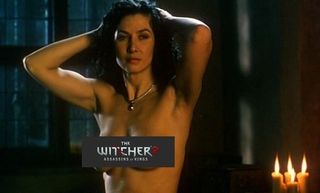
The guard, surprised to still be in this movie, explains that he can only let Geralt and Borch keep travelling down the road if they kill the dragon, and despite the fact that they're both swordsmen in the peak of fitness and accompanied by two horny warrior women, and he's an arthritic old man who will likely need help just standing up, do him the courtesy of pretending they need his permission. Geralt shows him his witcher's medallion, and it acts as his passport. It's then revealed that this was probably for the best, as several more guards now exist, previously camouflaged by bad editing.
Apparently nothing at all happens for the next few hours, because we cut to Geralt and Yennefer in the middle of the night. She tells him they're a bad match, mostly because of his tendency to rush out every few minutes and kill a monster. Geralt wisely avoids looking around at the dragon-slaying party she's travelling with and raising a sardonic eyebrow. Yennefer explains that the reason she's there is that she's there because she's heard of a recipe involving gloppy bits of dead dragon that might let her have a child, sorceresses in the Witcher universe being as sterile as the witchers themselves.
Geralt and Borch tag along with the group , doing some off-screen recon of the parties involved. This takes them to an abandoned quarry from Doctor Who, which Borch accidentally destroys by throwing a coin down on some rocks for no apparent reason. Rocks fall, lots of nameless extras die, and nobody really seems to give much of a damn, until suddenly they realise they should thanks to a stern wagging of a finger from Mr. Jumpcut. For some reason, Geralt rides uphill on a horse, but is immediately on on foot down in the chaos, completely ignoring all the injured around him and screaming for Yennefer, who is now in danger, apparently. Considering that Borch's expression at starting this rockslide was mild indifference at best, and Geralt didn't take a few seconds out of his day to make sure even Dr. Brennan wouldn't be able to identify his mangled corpse afterwards, we're probably supposed to assume wacky editing this time. (If you've read the original story of course, things are different...)
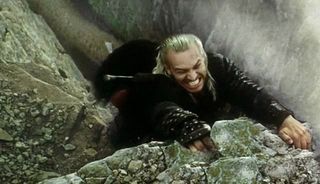
Yennefer has adopted Distressed Damsel Pose #4, hanging off the edge of a cliff. Geralt climbs down using something that looks oddly like a very, very long belt, while the music plays a piece of music called "You Know They Survive". He screams at Yennefer to maybe, you know, cast a spell or something, but she's too busy hanging. While this is going on, everyone else is pretty much just watching them to see what happens. It takes Dandelion to shout about someone finding a damn rope, and when he finds one, to be the only one who cares enough to pull them up. Two extras lend a hand, but immediately turn and walk away when the two are safe, apparently distracted by a bit of particularly interesting fungus over on a nearby rock. Geralt gives the onlookers a stare that makes it quite clear they just ended up on the Enemies of Carlotta list and announces that he's leaving.
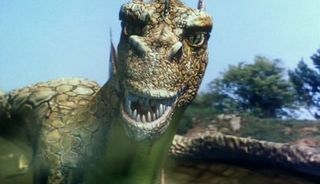
At this point (or possibly years later, it's honestly hard to tell) the dragon finally puts in an appearance. As with the titles, the way everyone rushes to look at it in its little valley is far, far too reminiscent of Monty Python and the Holy Grail to take seriously, and that's before you see the cheap special effects. "It's beautiful," says Dandelion. "Let's attack!" say the knights, even when it turns out this isn't in fact the dragon they're looking for and that this will therefore do them no real good at all.
Dandelion pleads with the knights to leave the dragon alone, and for Geralt and Yennefer to talk them out of it—although why Yennefer would possibly want to do this remains a mystery. The dragon flies overhead, claiming responsibility for the avalanche, if not the shocking editing, and informing them that it's a nice dragon and will therefore give them exactly one chance to leave before it crushes them. That it can talk takes most of the group by surprise, but one knight who apparently dreams of being dragon food in a can challenges it to a one-on-one duel anyway. The dragon somewhat wearily accepts on the grounds that, dude, it's a dragon . It doesn't even need fire. It just breathes halitosis on the guy, whose horse decides that it's not being paid enough for this shit and turns around. A quick whack of a tail later, and the would-be St. George is on his back, staring up at the sky for the rest of time. The assorted onlookers react with what can best be described as an "Oh. That just happened."
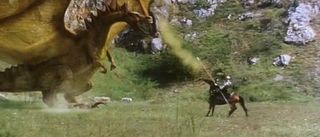
Despite the fact that he was standing right next to her for all this, Yennefer decides that this is the perfect time to beg Geralt to have a go against the dragon, promising that it'll mean they can get back together. Unfortunately, Yennefer babbled quite a bit while hanging off the side of that cliff, and Geralt doesn't buy it. Taking offense at the idea that he could be bought by the sorceress/witcher equivalent of "I'll let you look up my skirt for 10p", he turns her down. Instead, he finds the king in charge of the hunting party and suggests that the dragon should simply be left in peace. It's not hurting anyone, he argues, it's sentient, and most importantly, it's actively choosing not to burn them all alive like it so painfully can. Needless to say, the king laughs at this notion and...
No. Wait. He doesn't. Unlike most characters we've seen so far, he mulls it over for a moment, decides that Geralt is absolutely correct, and concedes the point. He and his army depart, thanking Geralt for his wisdom and leaving Yennefer and her remaining soldiers, who she has, apparently, to do whatever they want. Unfortunately for them, the soldiers opt to go hunting for baby dragons, which turns a currently very broody Yennefer against them. She tries to stop them, they grab her by the hair, and Geralt immediately teleports in to explain why this was a seriously bad idea for their health.
Then we cut to the dragon exploding for no reason.
One second. That edit actually wrenched a nerve in my neck.
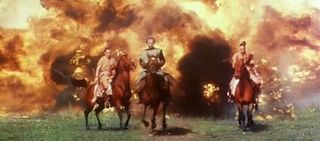
Borch, Vea and Tea ride out of the fireball, which they presumably caused, and also attack the soldiers for whatever reason. Yennefer is left holding the baby dragon cub, petting it affectionately, and wondering how much the vet's bills would cost. Later, they all sit around the fire, where Borch explains—sort of—that everything that happened was a bit of a scam, which Geralt already knew. Borch invites him to ask for a favour, but a bit of telepathy reveals that the only thing he actually wants is impossible for him to grant. Yennefer promptly mentions that she can read minds as well, which probably isn't what you want to hear from an ex-girlfriend several years after breaking up. The group splits up and heads off on their separate ways, Geralt again alone to wander the land in search of monsters.
Gasp! And that's another 20 minutes or so of the movie gone.
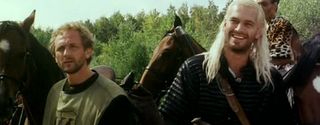
As before, this story is a horribly hacked around version of one of the original shorts, in this case The Bounds of Reason. Amongst the many, many changes or things made clearer, it's revealed that Borch is in fact a dragon who simply likes humans, and that the request that wasn't in his power to make was to cure Yennefer's infertility—much as he wishes he could. Most of the individual plot beats are also given room to breathe and expand, most notably Geralt's tendency to hide behind claims of a fictional witcher's code when he simply doesn't want to do something, and exactly what the deal is with the different characters and groups who are barely glimpsed in this abridged version of the story.
All this brings us 40 minutes into the movie. If you want to know what happens next, check Amazon or similar places for a copy of the full thing. It's not worth it though, even if the series, without all the cutting and abridging, looks like it would at least have been watchable TV fantasy. If you really want to know more about Geralt's story and the Witcher universe though, check out the books, starting with The Last Wish. There's some really good stuff in them, and they fill in a lot of plot gaps that the games simply (and probably incorrectly) assume you already know the explanations for.

Witcher remake studio boss says it'll remake what's 'bad, outdated, or unnecessarily convoluted' without naming the sex baseball cards we all know he's talking about

A new Witcher comic series spoils Geralt's retirement with a Western-styled 'homage to Andrzej Sapkowski, Clint Eastwood, and Sergio Leone'
Most Popular




